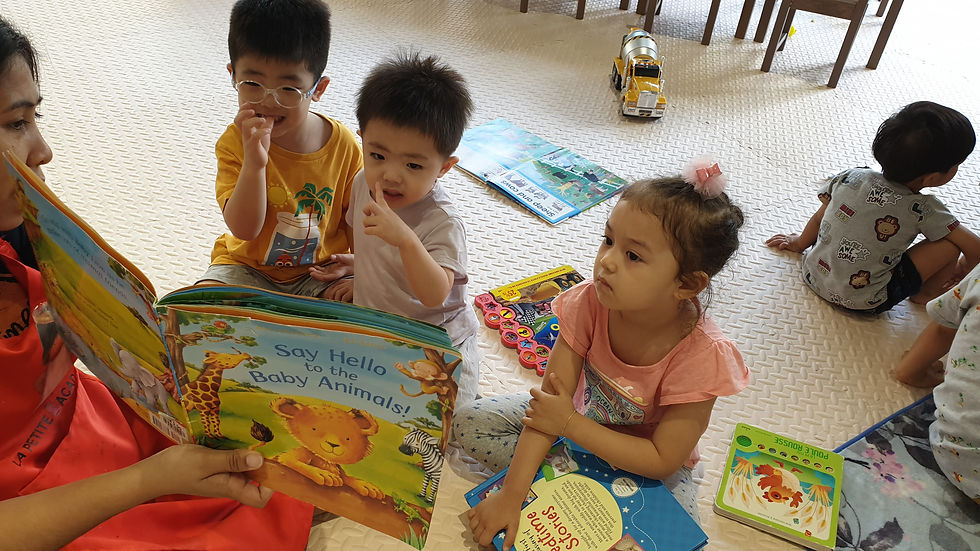The Importance of Early Childhood Education
- Mum N Kids Management
- Nov 25, 2025
- 3 min read
Early years are a critical period in a child's development. The foundation laid during this time shapes their future learning, behavior, and overall well-being. Understanding the importance of childhood education helps parents, caregivers, and educators provide the best start for young children. This article explores why investing in quality early learning experiences is essential and offers practical advice on how to support children's growth during these formative years.
Why the Importance of Childhood Education Cannot Be Overstated
Childhood education is more than just learning ABCs and numbers. It is about nurturing a child's cognitive, emotional, social, and physical development. Research shows that children who receive quality education early on tend to perform better academically and socially later in life. They develop critical thinking skills, creativity, and emotional resilience.
For example, children exposed to rich language environments develop stronger communication skills. Those who engage in play-based learning improve problem-solving abilities and social interactions. Early education also helps identify developmental delays or learning difficulties, allowing timely intervention.
Key benefits of early childhood education include:
Enhanced brain development through stimulating activities
Improved social skills by interacting with peers
Better school readiness and academic success
Increased self-confidence and independence
Reduced risk of behavioral problems
By prioritizing childhood education, communities can foster healthier, happier, and more capable individuals.

Practical Ways to Support Childhood Education at Home and in Schools
Supporting childhood education requires a collaborative effort between parents, teachers, and communities. Here are some actionable recommendations to create a nurturing learning environment:
At Home
Create a routine: Consistent schedules help children feel secure and understand expectations.
Read daily: Reading aloud builds vocabulary and imagination. Choose age-appropriate books and discuss stories together.
Encourage play: Play is a natural way for children to learn. Provide diverse toys and opportunities for creative play.
Limit screen time: Too much screen exposure can hinder social and cognitive development. Set clear limits and choose educational content.
Talk and listen: Engage in conversations, ask open-ended questions, and listen attentively to foster communication skills.
In Schools and Preschools
Qualified educators: Teachers trained in early childhood development can tailor learning to each child's needs.
Safe and stimulating environment: Classrooms should be welcoming, with materials that encourage exploration and discovery.
Parental involvement: Schools should encourage parents to participate in activities and maintain open communication.
Inclusive practices: Education should accommodate children with diverse backgrounds and abilities.
Regular assessments: Monitoring progress helps identify areas needing support and celebrate achievements.
By combining these efforts, children receive consistent support that maximizes their potential.
The Long-Term Impact of Early Learning Experiences
Investing in early childhood education yields benefits that extend far beyond the early years. Studies indicate that children who attend quality early education programs are more likely to graduate from high school, pursue higher education, and secure stable employment. They also tend to have better health outcomes and lower rates of criminal behavior.
For instance, a child who learns self-regulation and social skills early is better equipped to handle challenges and build positive relationships. These skills contribute to emotional well-being and success in adulthood.
Governments and policymakers recognize this impact and often allocate resources to improve access to early education. Communities that prioritize early learning see stronger economies and reduced social costs over time.

How to Choose the Right Early Childhood Education Program
Selecting the right program is crucial for a child's development. Here are some factors to consider when evaluating options:
Curriculum: Look for programs that emphasize holistic development, including cognitive, social, emotional, and physical growth.
Teacher qualifications: Experienced and trained educators make a significant difference in quality.
Class size: Smaller groups allow for more individual attention and better interaction.
Safety and cleanliness: The environment should be secure, hygienic, and child-friendly.
Parental involvement: Programs that encourage family participation foster stronger connections.
Flexibility: Consider schedules and services that accommodate your family’s needs.
Visiting centers, asking questions, and reading reviews can help make an informed decision. Remember, the goal is to find a place where your child feels happy, safe, and stimulated.
Embracing the Role of Early Childhood Education in Shaping Futures
The journey of learning begins long before formal schooling. By embracing the role of early childhood education, we invest in the future of our children and society. Every child deserves access to quality learning experiences that nurture their potential and prepare them for life’s challenges.
Whether through supportive parenting, quality preschool programs, or community initiatives, the importance of childhood education is clear. It is a powerful tool that shapes confident, capable, and compassionate individuals ready to contribute positively to the world.
Taking steps today to prioritize early learning can create a ripple effect of benefits that last a lifetime. Let us commit to providing the best foundation for our youngest learners and watch them thrive.
By understanding and acting on the importance of childhood education, we can ensure brighter futures for generations to come.




Comments